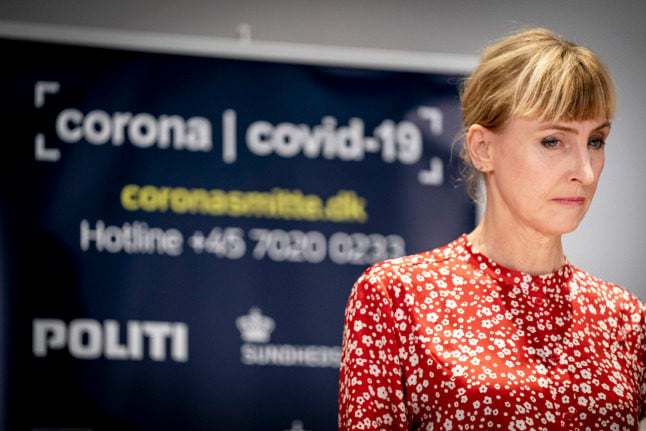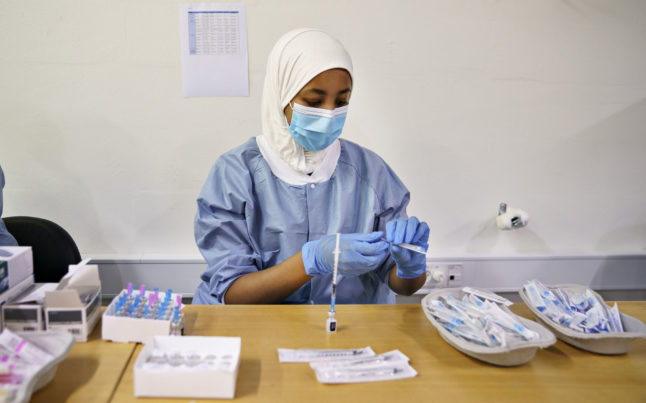“It is not realistic to achieve herd immunity, understood as meaning that we will not see any spread of infection at all,'” Tyra Grove Krause, the SSI’s acting academic director, told the Ritzau newswire. “We will still see infections with Covid-19, but we will not see serious complications to the extent that we have seen in the past, because the vaccine will protect us so well against serious disease.”
Why is herd immunity now a near-unattainable goal?
Herd immunity takes place when enough people are immune to infection to an illness that its reproduction number (the number of people each infected person in turn goes on to infects falls below one, without any other anti-infection measures in place. The number of infections will then gradually decline until the disease dies out of its own accord.
Before the emergence of more infectious variants such as the Alpha and Delta variants, most estimates had placed the threshold for herd immunity at between 60 to 70 percent of the population.
The growing dominance of the Delta variant, which is both more infectious and better able to infect people who are vaccinated, has now pushed that threshold to well over 80 percent, and even to as high as 90 percent.
“If the vaccines were 100 percent effective against the variants that are in play now, and we had a 100 percent vaccination coverage among those who are 12 years and older, then we could talk about achieving actual herd immunity against the delta variant,” Krause told BT. “But unfortunately this is not the reality, we can not achieve that.”
So does that mean we will see more and more outbreaks of the pandemic?
Perhaps, although future waves will look very different from what we saw last year and this year.
Krause said that even if Denmark does, as she expects, see a new wave of infections after people return to work and school at the end of this summer, that should not in itself be cause for alarm.
“We are going into a period where we will be able to tolerate much higher infection rates than we did previously because those who get infected will not become seriously ill,” she said. “Our threshold for when an infection rate counts as “high” has been shifted upwards.”
This means that it now actually does make sense to treat Covid-19 in the same way as we treat seasonal flu, and not respond to waves of infection with tight restrictions.
“It will be more reminiscent of the flu than before,” she told Ritzau.
READ ALSO:
- Why rising covid infections won’t lead to tougher national restrictions in Denmark
- One last push: How Denmark is battling to get the last citizens vaccinated
Is herd immunity absolutely impossible?
Not quite.
Krause said it was still possible that new, more effective vaccines, and a vaccination program involving children under the age of 12, could lead to genuine herd immunity in Denmark, but she said it was possible that even then, new variants would mean continued infections.
“We are dealing with a virus which is constantly changing a little bit, so you would expect there to be a variant that will dodge this new vaccine a bit.”
So does this mean Denmark’s vaccination program has failed?
Not at all.
Even though the Delta variant has shown itself able to spread even among largely vaccinated populations, this has not been accompanied with significant numbers of hospitalisations and deaths.
“The Delta variant also does not seriously threaten our vaccination program, because there is still a high level of protection against disease,” Krause said. “And that is the purpose [of the vaccines]: to prevent serious disease. It is not to eliminate viruses.”
The big question which will determine whether the Covid-19 crisis is finally over, she told BT, will be how long vaccines remain effective.
“The essential thing is the effectiveness of the vaccines and how long the effect lasts. These two factors will determine how the pandemic develops. We must keep a close eye on this and study it. It is too early to just let the infection run free because we have not yet reached a high enough number of vaccinated.”



 Please whitelist us to continue reading.
Please whitelist us to continue reading.
American here, I’m curious if it’s true that kids in Denmark didn’t wear masks in school last year?
If they did was it based on location? Age? I can’t seem to find a clear answer, just curious what it was like in Denmark.
Are there plans to mask kids this coming school year? (Most in US are advocating mandatory masks for aged 2+ all school day except when eating)
Appreciate any feedback!